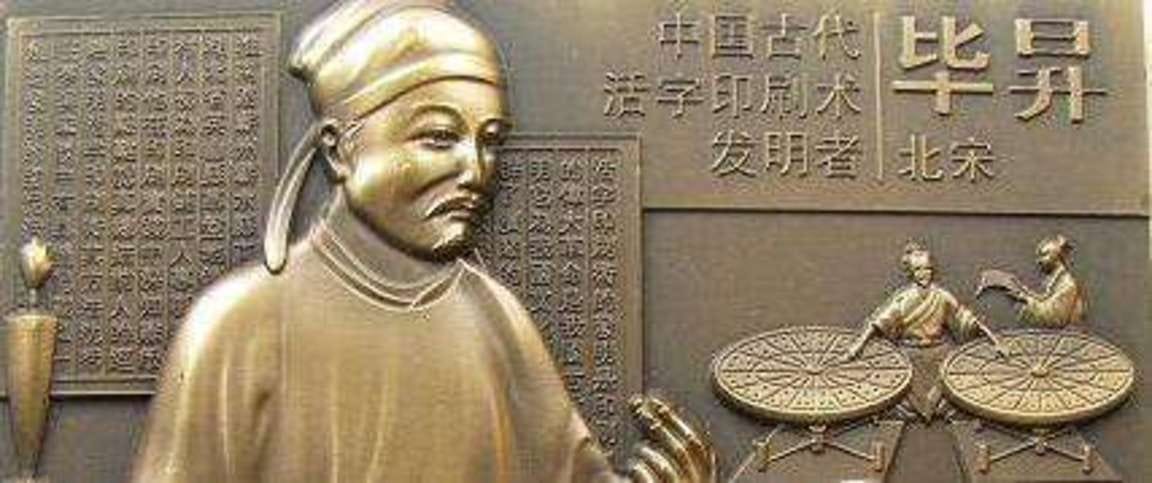Today’s Verse and Thought
“Remember the word that I said to you: ‘A servant is not greater than his master.’ If they persecuted me, they will also persecute you. If they kept my word, they will also keep yours.”(John 15:20)
From yesterday- From the time of Constantine to after the Protestant Reformation, access to the Bible was limited to only a few. And those few justified this censorship as something that was for the good of the people. These gatekeepers were the ones who laid a 1000 year-old Roman tradition of Christianity.
But what if they were wrong or trying to deceive the people?
Known also as movable type, this printing press technology was first made from porcelain materials and invented around 1040 in China, by the inventor Bi Sheng. Bi Sheng's clay types were fragile and not practical for large-scale printing. He also pioneered the use of wooden movable type, however abandoned the technology due to wood grains and the unevenness of the wooden type after being soaked in ink.
But in 1298, Wang Zhen, a Yuan dynasty official from Anhui Province, re-invented the method of making movable wooden type. He made more than 30,000 wooden movable types and printed 100 copies of Records of Jingde County, a book with more than 60,000 Chinese characters! (source)
When the Trouble Began
“Is not my word like fire, declares the Lord, and like a hammer that breaks the rock in pieces?”(Jeremiah 23:29)
For 1,000 years the Word of the Lord was locked away from the average citizen. It was carefully guarded by the Catholic Church. From 400-1450 AD the Western church held a monopoly on the Word of God, not only physically possessing it, but over the interpretation of it.
Scriptures were read in Latin; the Latin Vulgate Bible was declared the only “authentic” and authorized Bible, and any attempt at translating Scripture into common languages were banned or burned.
Not that many people could read anyway. Illiteracy was near-universal throughout the Empire. Because the Mass was in Latin, the laity only knew the Bible through the interpretation of the priests. And as we have previously seen, there was a great deal of doctrinal error taught. But how would the people know? They had no way to cross check what they were being told. The experts said it was so, and so it must be true. Right?
Right?
The Church spread its doctrine through sermons, and reinforced the stories through artistic renderings preserved in stained glass, frescoes, statues, and “miracle” plays. All of these methods were controlled by Rome and used to propagandized influence the culture. It’s similar to how the “experts” use mass communication today to create our own culture’s messaging, establishing our own version of “normal” life today.
Image source - quizizz.com
But cracks began to appear in the Catholic stronghold when a man named John Wycliffe translated the Bible in 1382. He did so by hand, carefully transcribing Latin into English.
Wycliff was competent in Latin, Greek, and Hebrew - the three scriptural languages. His hand-written copies began circulating underground. Lollards - “poor priests” -smuggled it village-to-village into the hands of hungry truth seekers.
This makes me pause and ask, why would the people risk their lives to smuggle these copies? Was it because they finally read what God’s Word actually said? Imagine for the first time in your life you read about God’s grace:
“…so that in the coming ages he might show the immeasurable riches of his grace in kindness toward us in Christ Jesus. For by grace you have been saved through faith. And this is not your own doing; it is the gift of God, not a result of works, so that no one may boast.”(Ephesians 2:7-9).
All those hundreds of years the Church controlled the people by threats of judgement and hell, selling indulgences; declaring the Church’s sole power of forgiveness…and what about purgatory? Or Mary and saint veneration? Or any of the other Church teachings that were traditions, but not Scripture?
“Truly, truly, I say to you, whoever hears my word and believes him who sent me has eternal life. He does not come into judgment, but has passed from death to life.”(John 5:24)
A fuse was lit across Christianity and the truth in God’s Word was about to be unleashed from its 1000 year prison.
The Fires of Truth
In 1450 movable-type printing was invented and the cat was out of the bag. Bi Sheng, a Chinese man, in 1040 AD had invented moveable type. Four hundred years later, this led to Gutenberg’s invention of the printing press using Sheng’s moveable type.
“Gutenberg's invention of the printing press enabled a much faster rate of printing. The printing press later spread across the world, and led to an information revolution and the unprecedented mass-spread of literature throughout Europe. It had a profound impact on the development of the Renaissance, Reformation, and humanist movements.” Wiki
The invention of the press lit the fires of reform as the Bible finally became accessible to plowboys, farmers, and fishermen. The 1000 year chains of control were breaking. And soon, another reformer joined the fight.
“So Jesus said to the Jews who had believed him, “If you abide in my word, you are truly my disciples, and you will know the truth, and the truth will set you free.” They answered him, “We are offspring of Abraham and have never been enslaved to anyone. How is it that you say, ‘You will become free’?”(John 8:31-33)
Martin Luther in Worms
“Martin Luther was a German priest and theologian who initiated the Protestant Reformation in the 16th century by challenging the practices of the Catholic Church, particularly the sale of indulgences. His most famous work, the "Ninety-Five Theses," published in 1517, criticized church corruption and emphasized salvation through faith alone.”Wiki
In 1517, a German monk named Martin Luther also began to challenge the Church’s authority. He was deeply troubled by all the erroneous Church practices such as the sale of indulgences. Luther wrote and published 95 Theses, questioning Church teachings and calling for reform.
His ideas quickly spread, thanks in part to the printing press, stirring a great deal of unrest across the Holy Roman Empire. One thing the Empire didn’t appreciate were trouble makers.
Church leaders demanded that Luther recant, but he stood his ground. In 1521, he was summoned to appear before the Diet of Worms. This wasn’t a middle ages Bill Gates eat-ze-bugs banquet; it was a formal assembly of the Empire’s leaders, held in the German city of Worms.
Presiding over the gathering was Emperor Charles V, who had the authority to judge both religious and political matters. When Luther arrived, he was presented with a table stacked with his writings and was asked a simple question: would he recant?
He asked for a day to consider.
The next day, Luther returned and, standing before the most powerful men in the empire, Luther refused to renounce his views unless they could prove him wrong by using either Scripture or sound reason. It’s here, according to tradition, that he declared, “Here I stand, I can do no other. God help me.”
Papa’s Mad
His refusal enraged the Church and imperial authorities. The result was the Edict of Worms, which declared Luther a heretic and an outlaw. His writings were banned, and they declared that he and his followers could be arrested - or killed - with no legal consequences.
It was open season on the Christians.
“I know that you are offspring of Abraham; yet you seek to kill me because my word finds no place in you.”(John 8:37)
But Luther never faced arrest. On his journey home, he was secretly taken into protective custody by allies, like Frederick the Wise, the Elector of Saxony. He hid Luther away in Wartburg Castle.
While in hiding, Luther began one of his most influential works: translating the New Testament into German, a major step toward making the Bible accessible to everyday people as German was the local language of the commoner.
The events at Worms in 1521 marked a turning point in history. Luther’s stand against the Church not only protected his own beliefs but also set off a religious movement that would reshape Christianity itself.
While Luther’s intent was to try and reform the corrupted Catholic Church, what ended up happening was a rebirth of the first centuries of Apostolic teaching as the Protestant Reformation brought the truth back to life.
Would the Word of God finally be interpreted and taught correctly?
To be continued…
Today’s Question
Today’s Prayer
Father I pray today for all your people in our country that they come to fully understand how privileged we are to have easy access to your Word. So many of us not only have several hard copies, we have access to digital versions too. Forgive us for being so cavalier about this. I think about the story of the treasure of the pearl in Matthew. Your truth and Salvation is that pearl. We have such a priceless treasure in your Word that most people throughout all of history didn’t get to have. I think about how excited men like Luther would be if they could see what their sacrifice meant for us today. Thank you for these men and their bravery. I pray that we appreciate what we have and not treat it with contempt. Thank you for your Word. Thank you for the life that we have today. May all honor and glory be yours. Amen❤️




